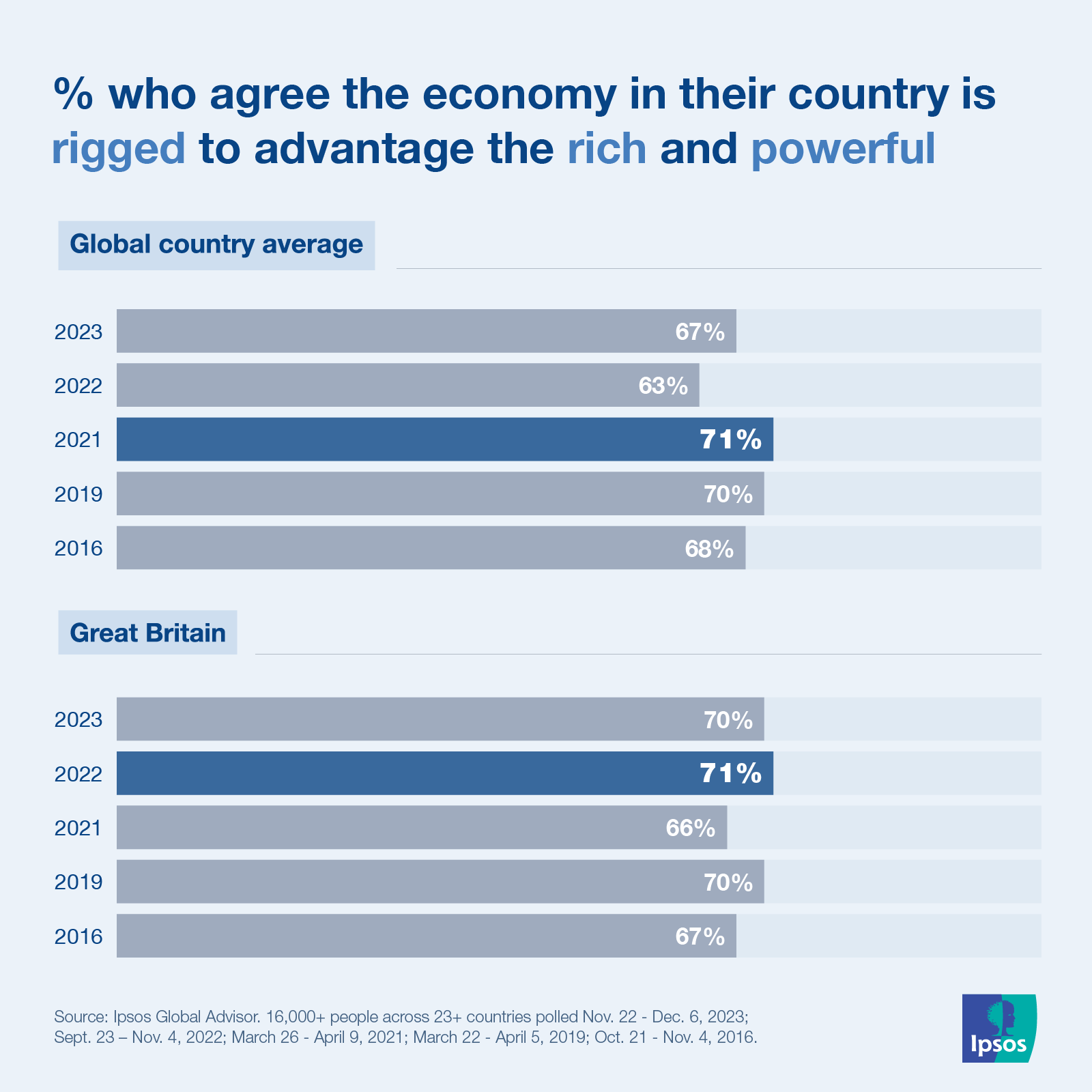Data Dive: Majority across the generations think things are broken, declining and rigged
Perspective is everything.
The first few years of the 2020s have been pretty dark. The decade started with a once-in-a-century pandemic, then came the crushing cost-of-living crisis, add in the full-scale invasion of Ukraine and the Israel-Hamas war, and you have a recipe for pessimism. On the brighter side, COVID-19 is no longer a global emergency and while red-hot inflation hasn’t fully cooled off, prices have generally stopped soaring into the stratosphere.
While there are reasons to feel increasingly sunny, there are also reasons to still feel gloomy.
Case in point: the latest wave in of the Ipsos Global Inflation Monitor finds 60%, on average across 33 countries, say they’re either just about getting by or finding it quite/very difficult to manage financially.
When making ends meet every month can be so hard for so many hard-working people it’s easy to understand why populist politicians, such as former U.S. President Donald Trump, are finding an eager audience.
The feeling that their country isn’t exactly in a great place right now goes well beyond the U.S. Close to four in five (78%) people in Sweden, for example, think things in their country are off on the wrong track.
What’s leading to such grim views? Nicklas Källebring, Head of Public Affairs in Sweden, explains the Northern European country has “been hit by a wave of violence with shootings and explosions as a result of gang conflicts between criminals.” Plus, “there are shortcomings in health care (queues) and in other public services. In parallel with this, we have seen a growing polarization of opinion in society and a long-term pessimism about developments in Sweden.”
Like other people in other places around the world, the majority (63% in Sweden and 57% on average across 30 countries) are unsatisfied with the social and political situation in their country, while similar proportions (62% in Sweden and 57% globally) are unsatisfied with the economic situation in their country.
Those that aren’t satisfied in Sweden and elsewhere will soon have the chance to vote for some change, or not, during the European Parliamentary elections in June. And with voters in over 60 countries going to the polls this year, many politicians looking to get elected soon appear to be facing displeased electorates.
A few months in to what’s being touted as the biggest election year in history we dig deeper into our recent global Populism in 2024 polling and find many citizens perceive their country to be in shambles and are open to a rule-breaking leader who promises to mend things.
Back in my day.
Images of grumpy old men in red-and-white Make America Great Again hats have become shorthand for populists who yearn for the good ‘ol days but our polling reveals a much wider swath of society believe their country is in decline.Baby Boomer* men and Generation X women (both at 61% on average across 28 countries) may be the most likely cohorts to agree their country is in decline, but the reality is that more than half of men and women across the generations think their country is declining.
And the majority, from grandkids to grandparents, also believe society is broken, with Gen Xers (58%) leading the way followed very closely by Boomers and Millennials (both at 57%) and Gen Zers (54%).
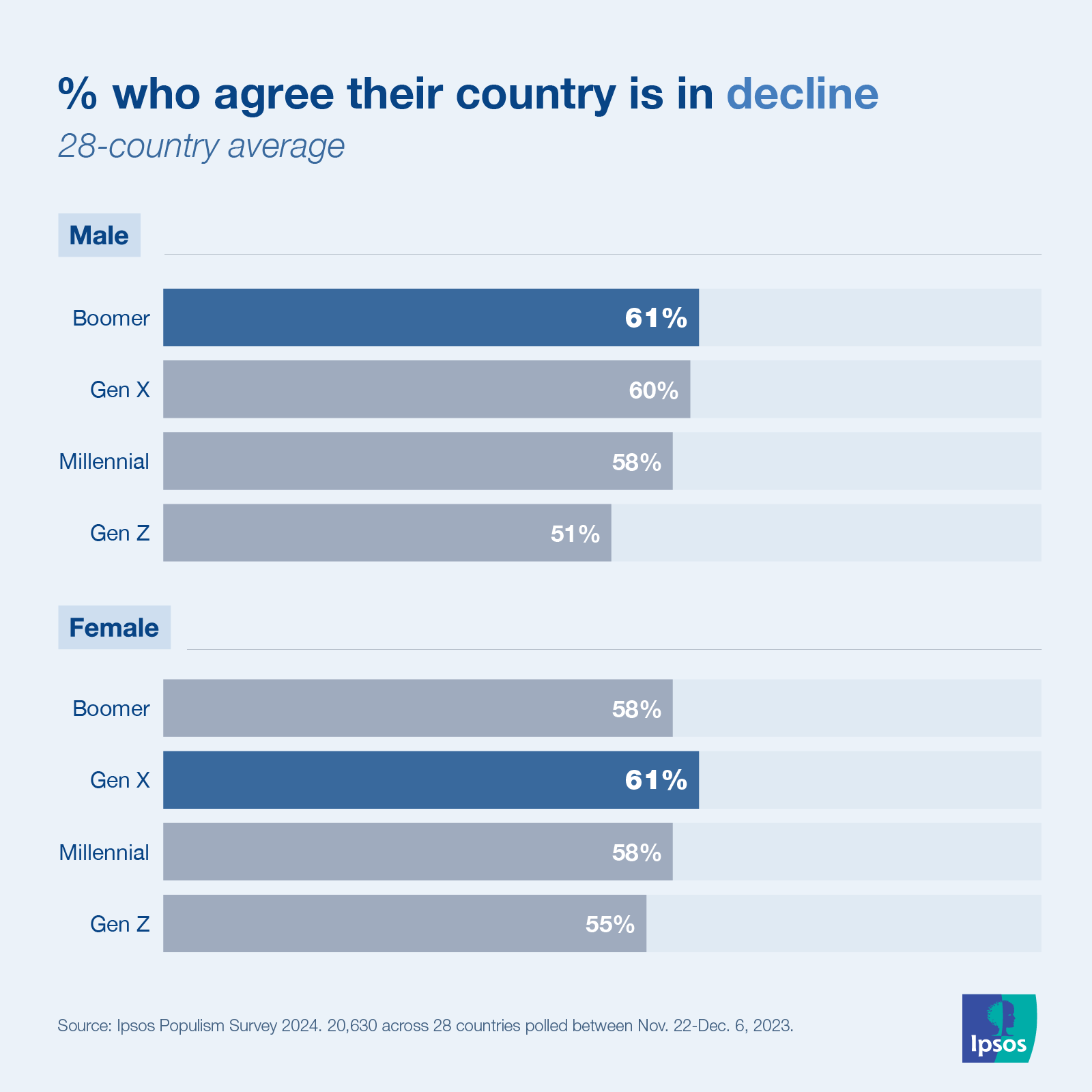
Smash the system.
A fair proportion of people seem to think the solution to a broken society and a country in decline is a populist leader in the vein of, for example, Argentina’s recently elected President Javier Milei.Almost half (49% on average across 28 countries) agree that to fix their country they need a strong leader willing to break the rules. And in some countries with elections this year the appetite is for a rule-breaking leadership is quite strong, including almost three in four (73%) in India where general elections are currently underway, with results set to be released on June 4.
In Great Britain, 53% agree that to fix their country it needs a strong leader willing to break the rules with Boomer men (58%) the most likely cohort to believe this.
We know there is intense public dissatisfaction with the way things are going in Britian and how the current government is running the country. Therefore, it is no surprise to see public sentiment advocating for strong political leadership,” says Keiran Pedley, Director, Politics & Society, for Ipsos in the U.K.
“Looking ahead to the next election [which must be held by January 8, 2025], we know that older men tend to be the most likely to say they will vote for Reform UK, a party that could be a major disruptor in the coming campaign and particularly damaging to the governing Conservative Party.”
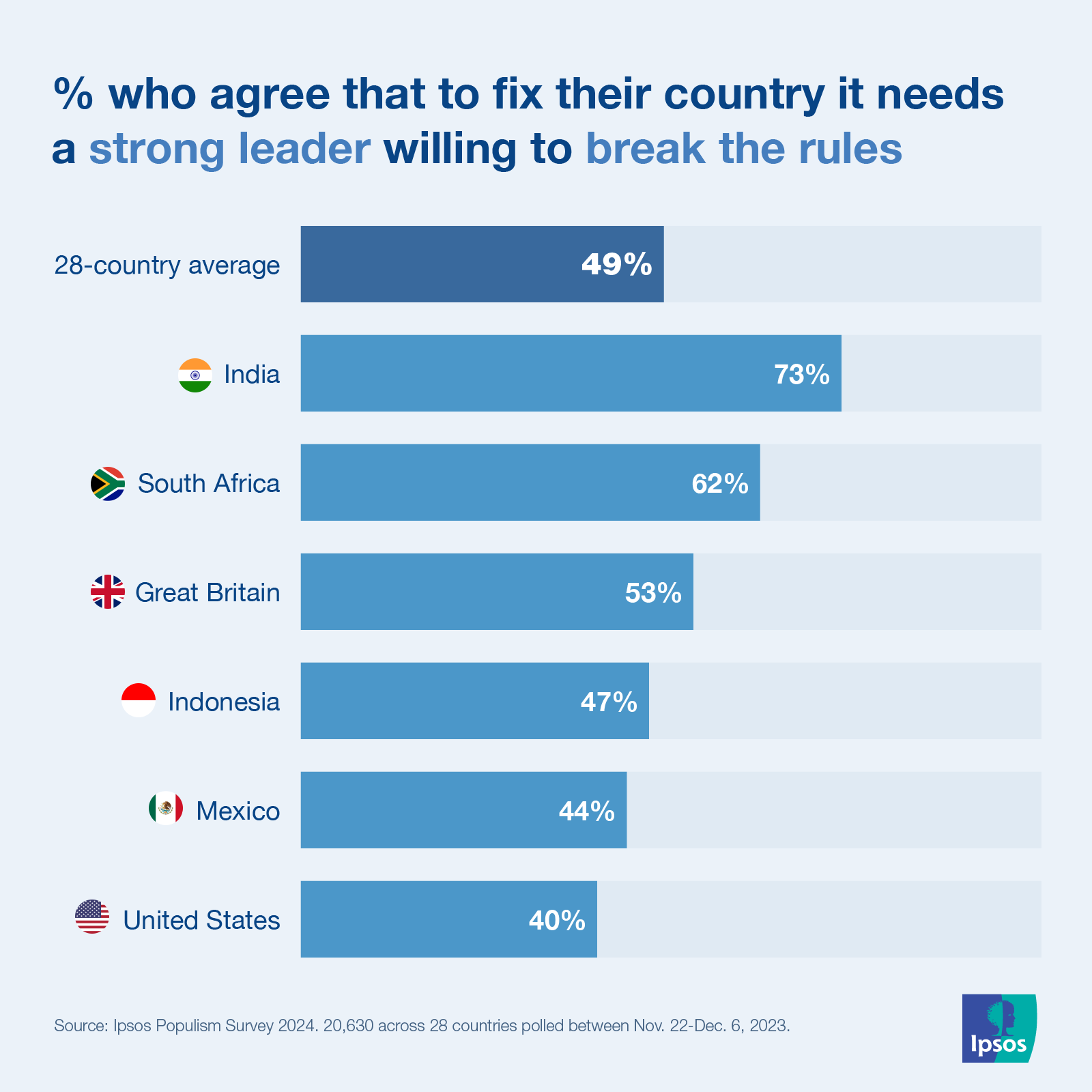
Not feeling cared about.
People who have been around the block a few times are particularly likely to think traditional parties and politicians don’t care about them.Just over two in three (67% on average across 28 countries) Boomer and Gen X men, feel this way. But even among younger cohorts, there’s few believe politicians are empathetic – with 58% of Gen Zers agreeing traditional parties/politicians don’t care about people like them.
The feeling that traditional parties/politicians don’t care hit a high of 68%, on average across 25 countries, near the peak of the COVID-19 pandemic in 2021, then fell in 2022 only to rise again ever so slightly.
Following years of political chaos, and a failed coup in late 2022, it’s little surprise a strong majority (79%) of Peruvians think traditional parties and politicians in Peru don’t care about them these days. “This result is aligned with the low approval rates that both the President of the Republic (8%) and the Congress of the Republic (8%) have in face-to-face surveys at the national level (urban and rural) that Ipsos does in Peru every month,” says Alfredo Torres, President of Ipsos in Peru.
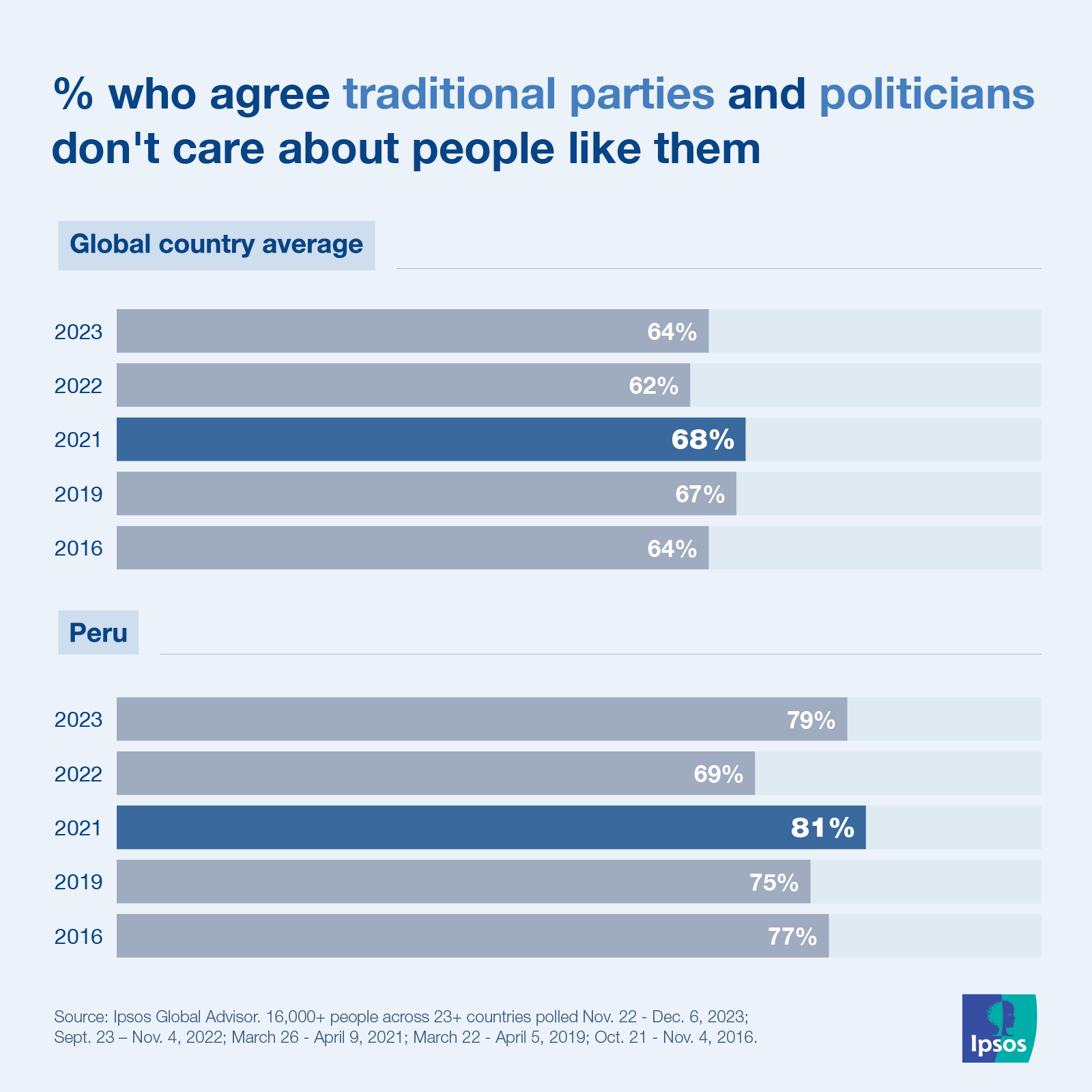
Feeling misunderstood.
The new kids on the block, Gen Zers, have become the main focus of many experts, marketers and politicians in recent years, so it makes sense they’re the least likely generation (55% of Gen Z women and 57% Gen Z men) to say experts don’t understand their lives.On the flipside, older people, and in particular Gen X women (67%), who are generally not the main focus in our youth-obsessed society are the most likely to agree experts in their country don’t understand their lives.
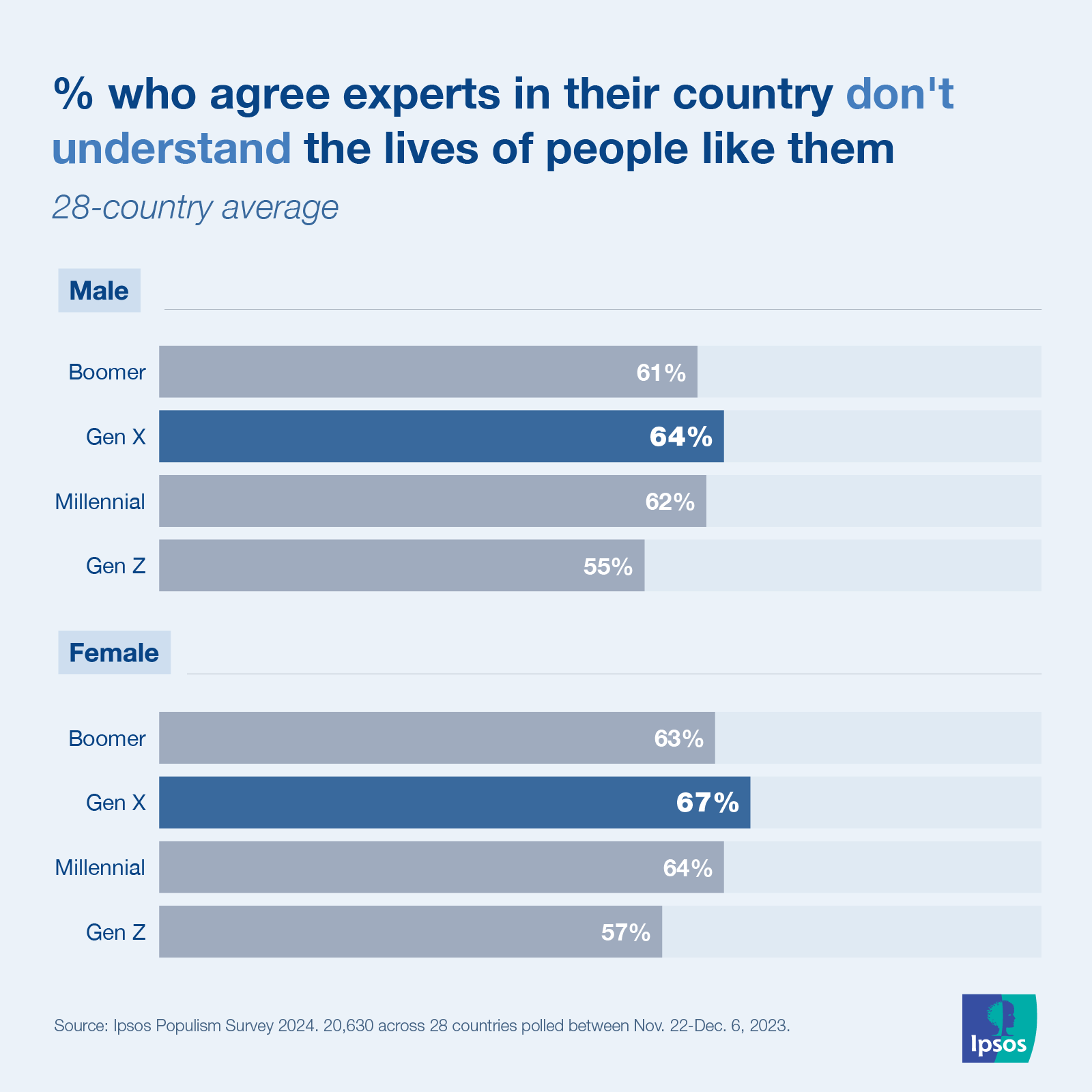
The rich keep getting richer.
While the cost-of-living crisis has receded somewhat many are clearly still feeling stung.The proportion who think the economy in their country is rigged to advantage the rich and powerful hit 71%, on average across 25 countries in 2021, as people were grappling with both the pandemic and inflation. The belief that the economy is rigged dropped down globally in 2022, but swung back up to 68%, on average across 28 countries, by late 2023.
These days, this sentiment is fairly strong across the generations with 71% (on average across 28 countries) of Gen Xers believing the economy in their country is rigged to advantage the rich and powerful, followed by Boomers (68%), Millennials (67%) and Gen Zers (63%).
While inflation in Great Britain has cooled considerably (dropping to 3.2% in March 2024, well down from 11.1% in October 2022) Brits, and in particular young women, are feeling bleak about where things could be headed.
“Pessimism about the economy is not reserved for older cohorts,” notes Pedley. “In fact, our analysis of economic optimism over time suggests that younger cohorts are more pessimistic about the future of the economy,with younger women the most pessimistic. So, whether or not the economy is seen as ‘rigged’ per se is only part of the story when it comes to public sentiment about the economy in Britain.”
